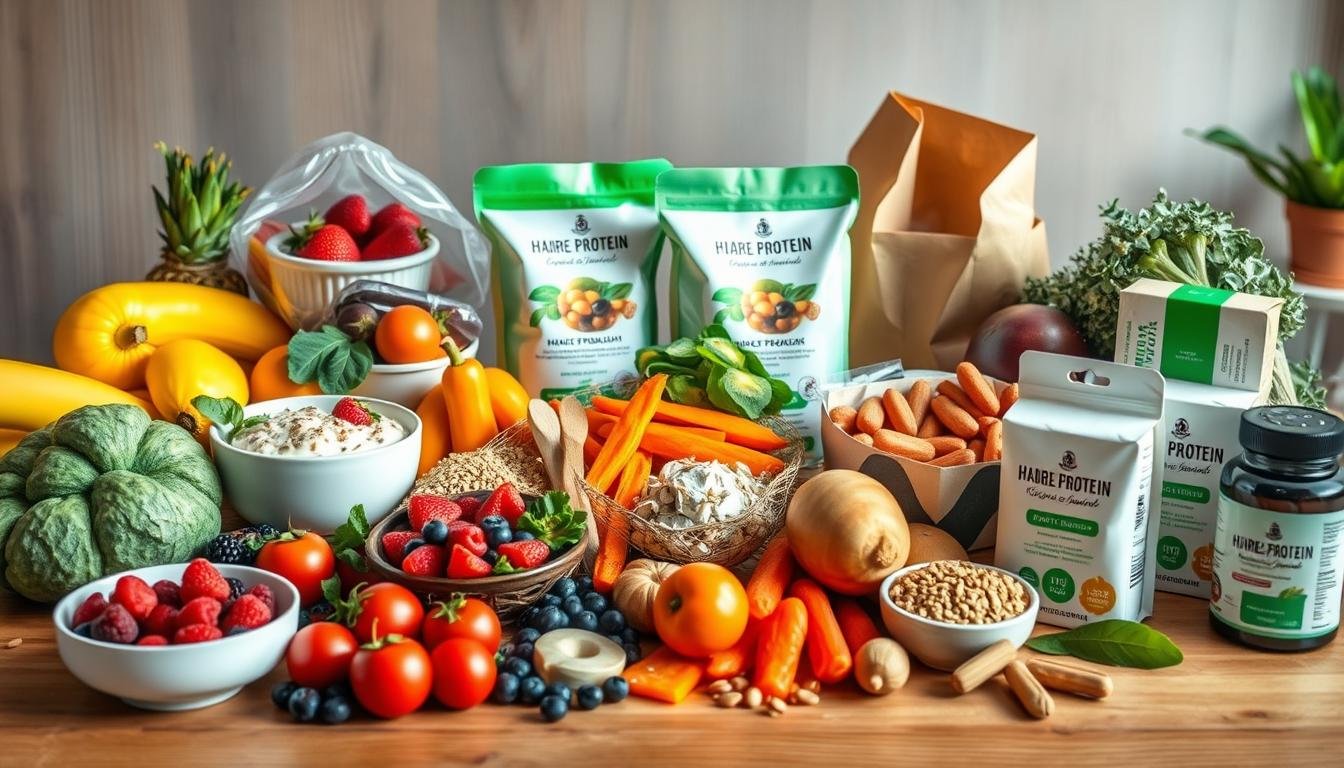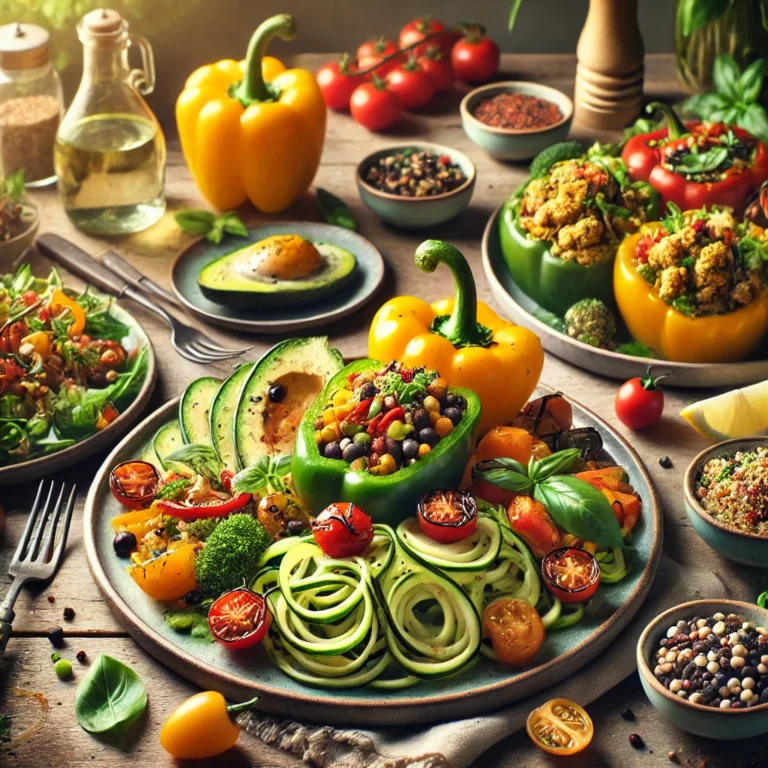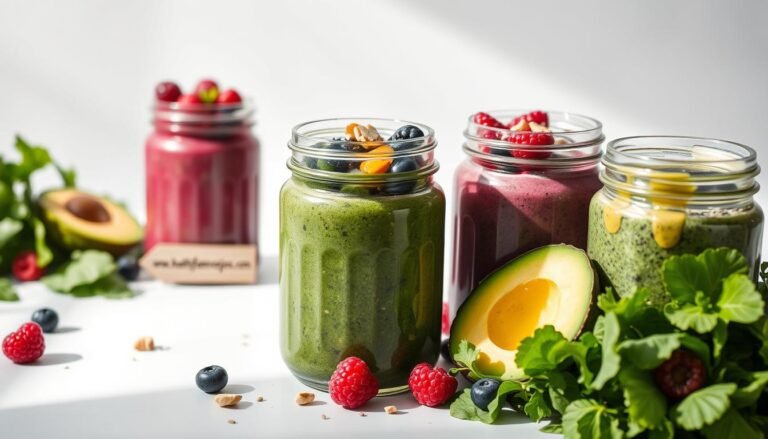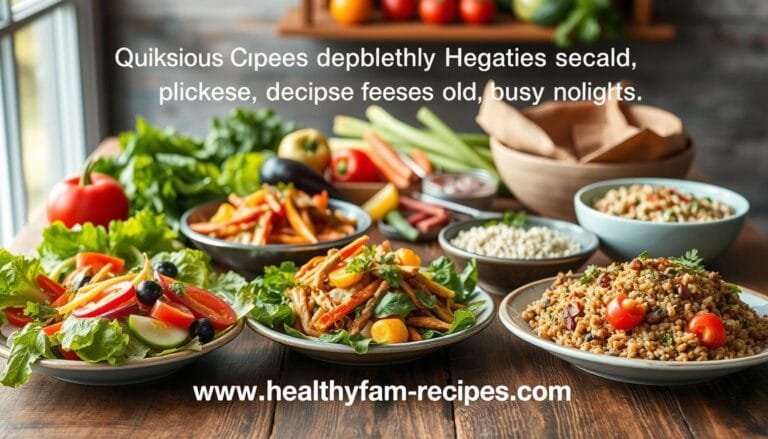Nutrition for Aging: 20 Powerful Nutrients for a Vibrant Life
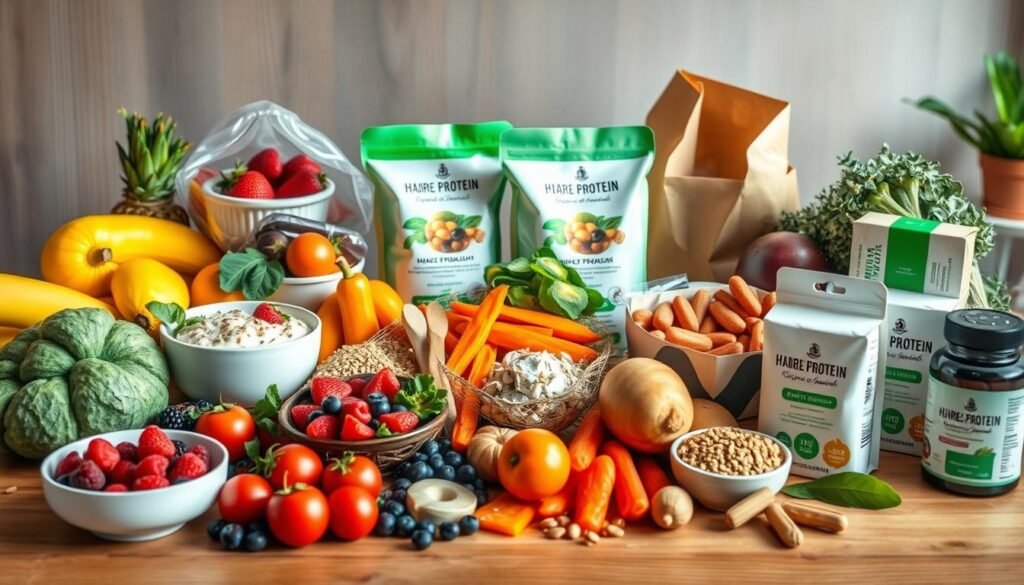
Table of Contents
Margaret turned 72 and noticed her diet wasn’t working for her anymore. She used to love big meals, but now her body craved something different. It wanted foods that were easy to digest and full of nutrients to keep her feeling young.
As people get older, their nutritional needs change a lot. Good Nutrition for Aging is key to staying independent and feeling good. Appetites may decrease, and the body needs specific nutrients to stay healthy.
This guide will show you 20 easy-to-digest foods and supplements for seniors. They help make sure you get the nutrients you need without upsetting your stomach.
Key Takeaways
- Nutrition needs change significantly with age
- Protein becomes increasingly important for maintaining muscle mass
- Digestibility matters more than quantity
- Supplements can fill nutritional gaps
- A balanced diet supports overall senior health
Understanding Nutrition for Aging
Aging changes how our bodies need nutrients and digest food. Our metabolism slows, muscle mass goes down, and digestion gets harder. Knowing these changes helps seniors stay healthy with the right soft foods and supplements.
Physical Changes Affecting Digestion
Our bodies change in ways that affect digestion as we age:
- Less muscle means a slower metabolism
- Less stomach acid
- Food moves through the intestines slower
- Our body makes fewer enzymes
Nutrient Absorption Challenges
Older people have trouble absorbing nutrients. They often find it hard to get the vitamins and minerals they need.
| Nutrient | Daily Recommended Intake | Absorption Challenge |
|---|---|---|
| Vitamin D | 600 IU for 71+ years | Reduced skin synthesis |
| Calcium | 1,200 mg | Decreased intestinal absorption |
| Fiber | 21-30 g | Slower digestive transit |
Common Digestive Challenges
Digestive health gets more complicated with age. Functional dyspepsia affects 20-45% of older adults. Over 30% of people aged 60 and above have lactose intolerance.
“Nutrition is not just about eating, it’s about learning to live a healthier, more balanced life.” – Unknown
Seniors can make better food choices by understanding these changes. They can choose soft foods and use digestive health supplements to meet their nutritional needs.
Essential Nutrients for Healthy Aging
Nutrition for Aging is key to staying healthy as we get older. Knowing the six essential nutrients is vital for seniors wanting to live well. These include protein, carbs, fats, vitamins, minerals, and water. They form the base of a diet that helps us age well.
An anti-inflammatory diet is a smart choice for older adults. The Mediterranean Diet is a great example. It helps keep the mind sharp and boosts overall health. Eating foods high in fiber also helps with digestion and managing chronic diseases.
- Protein: Crucial for muscle maintenance (10-30% of daily calories)
- Carbohydrates: Energy source (45-65% of daily calories)
- Fats: Essential for nutrient absorption (20-35% of daily calories)
“Nutrition is the foundation of healthy aging” – National Institute on Aging
Older adults need to pay extra attention to certain nutrients. Omega-3 fatty acids are good for the brain. Calcium and vitamin D are important for strong bones. Magnesium helps with brain function and may slow down cognitive decline.
| Nutrient | Key Benefits | Recommended Sources |
|---|---|---|
| Vitamin D | Muscle function | Fatty fish, fortified foods |
| Omega-3 | Brain health | Fish, nuts, seeds |
| Calcium | Bone strength | Dairy, leafy greens |
Practical tips for seniors include eating nutrient-rich meals and drinking plenty of water. Focus on whole foods. The MIND Diet is a good guide. It includes berries, leafy greens, nuts, whole grains, and fish. These foods help keep the mind sharp and the body healthy.
Nutrition for Aging: 20 Easy-to-digest Foods and Supplements
Creating meals for seniors requires careful thought about their dietary needs. Older adults face special nutritional challenges. They need specific foods to keep their health and digestion in check.
As seniors’ appetites shrink, picking the right foods is key. They need foods that are easy on their stomachs and full of nutrients.
Soft Proteins and Dairy Products
- Scrambled eggs with soft vegetables
- Greek yogurt with probiotics
- Cottage cheese
- Soft-cooked fish
- Protein smoothies
Seniors should eat proteins that are soft and easy to digest. Probiotics in yogurt can help improve gut health and aid digestion.
Gentle Carbohydrates and Grains
- Oatmeal
- Quinoa
- Mashed sweet potatoes
- Soft-cooked rice
- Banana-based pancakes
“Choosing the right carbohydrates can make a significant difference in senior nutrition and digestion.” – Nutrition Expert
Digestible Fruits and Vegetables
- Steamed carrots
- Mashed avocado
- Soft-cooked spinach
- Pureed pumpkin
- Ripe bananas
| Food Category | Nutritional Benefits | Digestibility Rating |
|---|---|---|
| Soft Proteins | High protein, easy to chew | 9/10 |
| Gentle Carbohydrates | Steady energy, fiber-rich | 8/10 |
| Digestible Fruits/Vegetables | Vitamins, minerals, hydration | 9/10 |
By focusing on meals that are easy to digest, seniors can stay healthy. They can also enjoy tasty and comfortable meals.
Hydration Strategies for Seniors Concerning Nutrition for Aging
As we get older, staying hydrated gets harder. Older adults often find it tough to drink enough water. This is because they might not feel thirsty as much and could have trouble moving around.
“Hydration is not just about drinking water – it’s about supporting your body’s entire nutritional ecosystem.”
Seniors face special challenges when it comes to staying hydrated. Their bodies don’t feel thirsty as much, which means they need to drink water on purpose. This is key to avoiding health problems.
- Aim for 6-8 glasses of fluid daily
- Include vitamin and mineral supplements to support hydration
- Choose water-rich foods to boost fluid intake
Water-rich foods can help a lot with staying hydrated. Here are some good choices:
| Food | Water Content |
|---|---|
| Iceberg Lettuce | 96% |
| Tomatoes | 95% |
| Celery | 95% |
| Watermelon | 91% |
It’s important to know the signs of dehydration. These include confusion, dry mouth, and reduced cognitive function. Some medicines, like diuretics, can make dehydration worse. So, it’s good to talk to your doctor about it.
There are fun ways to drink more water. You can add fruits to your water, drink electrolyte-rich drinks, or make smoothies with lots of vitamins and minerals.
- Use colorful fruit-infused water.
- Enjoy hydrating smoothies
- Set regular drink reminders
- Consume electrolyte-rich beverages
Drinking enough water helps your body absorb nutrients better. It’s good for your health as you get older. Talk to a doctor to make a plan that fits your needs.
Meal Planning for Optimal Digestion
Creating the right Nutrition for Aging plan is key for elderly nutrition and digestive health. As we age, our nutrition needs change. We must focus on meals rich in nutrients for our well-being.
Seniors face special dietary challenges. They need a meal plan that’s carefully thought out. Research shows most Americans don’t get enough fiber, which is vital for good digestion.
Portion Control Guidelines
Knowing the right portion sizes is important for elderly nutrition. The federal guidelines suggest specific calorie ranges:
- Women 60+: 1,600-2,200 calories per day
- Men 60+: 2,000-2,600 calories per day
Timing of Meals
When we eat can greatly affect digestion and how well we absorb nutrients. Experts suggest:
- Eating smaller, more frequent meals
- Spacing meals 3-4 hours apart
- Avoiding big meals before bedtime
Food Preparation Methods
Choosing the right way to prepare food can make it easier to digest and keep nutrients in. Here are some good techniques:
| Preparation Method | Digestibility Benefits |
|---|---|
| Steaming | Preserves nutrients, soft texture |
| Pureeing | Easier to digest, versatile |
| Slow Cooking | Breaks down tough fibers |
A healthy gut with diverse bacteria can help reduce inflammation and support overall well-being.
Pro tip: Aim for daily fiber intake of at least 30 grams to support digestive health and maintain nutrient-dense meals.
Beneficial Supplements for Aging Adults
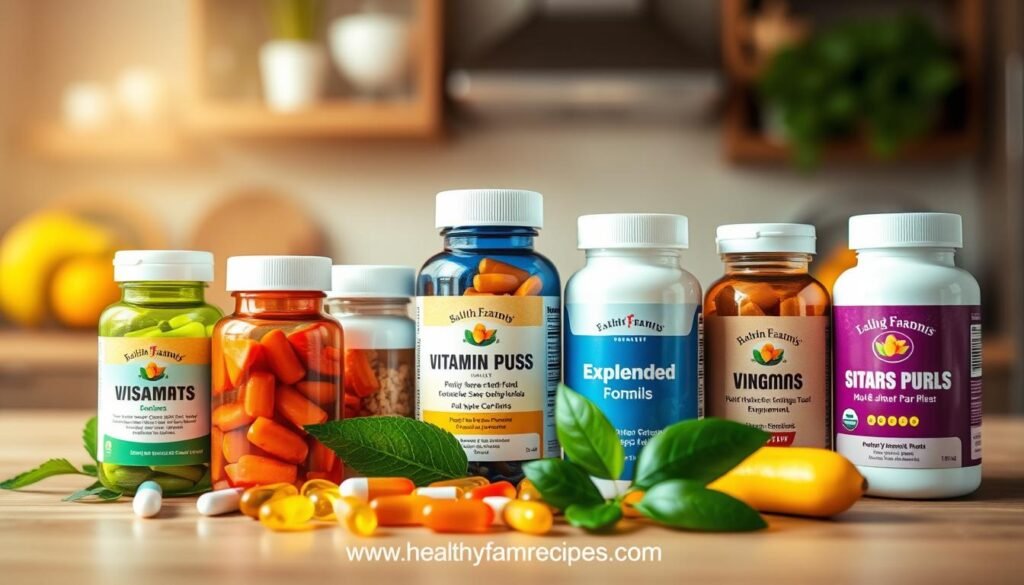
As people age, they often struggle to get the nutrients they need. Up to 70% of American adults don’t get enough vitamins and minerals from food. This is why supplements are so important for seniors.
There are key supplements that can help fill these nutritional gaps. Seniors should consider the following:
- Vitamin D: Critical for bone health and immune function
- Vitamin B12: Essential for nerve function and red blood cell production
- Calcium: Supports bone strength and prevents osteoporosis
- Omega-3 fatty acids: Promotes heart and brain health
Digestive health supplements are also vital. They help with nutrient absorption and gut health. As people get older, their body’s ability to digest food naturally decreases. Probiotics and digestive enzymes can help keep the digestive system healthy.
| Supplement | Daily Recommended Amount | Key Benefits |
|---|---|---|
| Vitamin D | 20 mcg (for adults 71+) | Bone health, immune support |
| Probiotics | 2 capsules daily | Gut health, nutrient absorption |
| Omega-3 | Varies (consult healthcare provider) | Heart and brain health |
*Always consult with a healthcare professional before starting any new supplement regimen.*
Nutrition experts suggest choosing high-quality supplements from trusted brands. They should be part of a balanced diet. Supplements can help aging adults stay healthy.
Creating Nutrient-Dense Soft Food Meals
Preparing meals for seniors is all about nutrition and ease of eating. Soft foods are key to keeping them well-nourished and comfortable while eating. Nutrition for Aging helps seniors get the nutrients they need without upsetting their stomachs.
Seniors have special dietary needs that require thoughtful meal planning. The aim is to make dishes that are easy to chew, swallow, and digest. Nutrition for Aging should also be full of important nutrients.
Nutrition for Aging and Breakfast Options
- Smoothie bowls with Greek yogurt and soft fruits
- Overnight oats with chia seeds and pureed berries
- Soft-scrambled eggs with finely chopped vegetables
- Protein-rich cottage cheese with mashed avocado
Nutrition for Aging and Lunch and Dinner Ideas
- Creamy vegetable soups with tender proteins
- Poached fish with pureed sweet potatoes
- Slow-cooked chicken with well-mashed vegetables
- Quiche with leafy greens and soft cheese
Nutrition for Aging and Healthy Snack Suggestions
- Yogurt parfaits with soft fruits
- Vegetable-based dips with steamed vegetable sticks
- Applesauce with ground nuts
- Soft fruit smoothies
When making Nutrition for Aging, focus on high nutrient value. The World Health Organization says to eat at least 1 1/2 cups of fruits and veggies every day. Seniors should aim for 1-1.2 grams of protein per kilogram of body weight to keep muscles strong and healthy.
Cooking should be simple, nutritious, and enjoyable for seniors.
Use herbs and spices to add flavor instead of salt. Cooking in big batches can save time. Getting family involved in cooking can make meals more fun and social.
USDA Food Patterns for Seniors
The U.S. Department of Agriculture (USDA) has special dietary guidelines for seniors. These guidelines focus on the unique needs of older adults. They aim to support health and wellness through nutrient-dense foods.
Key recommendations for senior nutrition include:
- Prioritizing nutrient-rich foods with lower caloric density
- Ensuring adequate protein intake to maintain muscle mass
- Incorporating foods that support bone and heart health
- Adapting portion sizes to match reduced metabolic rates
Nutrition experts emphasize that seniors require a strategic approach to eating that goes beyond simple calorie counting. The USDA guidelines suggest specific strategies for meeting age-related dietary needs:
“Eating well is not about restriction, but about choosing foods that nourish and support your body’s changing requirements.” – USDA Nutrition Panel
Seniors should focus on:
- Consuming calcium-rich foods for bone health
- Choosing foods high in fiber for digestive wellness
- Selecting protein sources that are easy to digest
- Maintaining hydration through varied fluid sources
The latest USDA recommendations stress the need for personalized nutrition plans. These plans should consider individual health conditions and activity levels. By following these guidelines, seniors can stay vital, support their immune function, and improve their overall quality of life.
Managing Common Dietary Restrictions
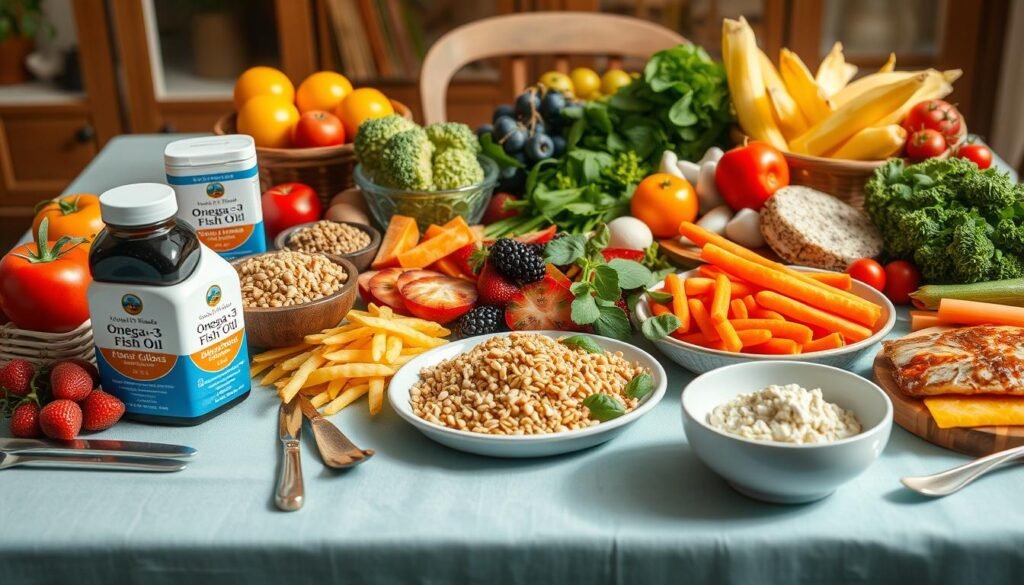
Seniors face challenges when dealing with dietary restrictions. It’s key to adapt meals to keep health in check. An anti-inflammatory diet helps manage chronic conditions common in older age.
“Nutrition is not one-size-fits-all, especailly for older adults with specific health needs.” – Nutrition Expert
Seniors often have to follow certain diets due to health issues. These diets might include:
- Low-sodium diets for hypertension management
- Low-sugar diets for diabetes control
- Low-fat diets for heart health
Adding high-fiber foods is a smart move for seniors. It helps meet nutritional needs while following dietary rules. The goal is to make meals both healthy and tasty.
| Dietary Restriction | Recommended Alternatives |
|---|---|
| Low-Sodium Diet | Fresh herbs, citrus seasonings, salt-free spice blends |
| Diabetes Management | Complex carbohydrates, lean proteins, controlled portion sizes |
| Heart-Healthy Approach | Omega-3 rich foods, whole grains, plant-based proteins |
Creative cooking can make restricted diets enjoyable. Techniques like steaming, roasting, and using herbs add flavor without breaking the rules. Seniors should team up with healthcare professionals to craft nutrition plans that fit their health needs.
Building a Senior-Friendly Kitchen
Creating a safe and efficient kitchen is key for seniors. It helps them stay independent while cooking soft foods and nutrient-dense meals. The right setup makes cooking easier, safer, and more fun for older adults.
Essential Kitchen Tools for Easy Meal Preparation
Seniors need special kitchen tools for easy food prep and nutrition. Here are some must-haves:
- Electric can openers with large handles
- Lightweight food processors
- Ergonomic measuring cups
- Non-slip cutting boards
- Easy-grip utensils with padded handles
Smart Food Storage Solutions
Good food storage keeps meals fresh and makes planning easier. Invest in:
- Clear, stackable containers with easy-open lids
- Portion-controlled storage options
- Freezer-safe meal prep containers
- Vacuum-sealed storage bags
Safety Considerations in the Kitchen
Kitchen safety is very important for seniors. Here are ways to make cooking safer:
- Install bright, uniform lighting
- Use non-slip mats near cooking areas
- Keep frequently used items at easily accessible heights
- Remove loose rugs that might cause tripping
“A well-designed kitchen can help seniors maintain their independence and continue enjoying nutritious, home-cooked meals.” – Nutrition Experts
By organizing the kitchen well and choosing the right tools, seniors can cook delicious, soft foods. They can do it with confidence and ease.
Social Aspects of Senior Nutrition
Elderly nutrition is more than just eating right. Nutrition for Aging is about the social connections that make meals special. These connections help older adults stay healthy and happy.
“Sharing a meal is about nourishing not just the body, but the soul.” – Nutrition Expert
Being social has a big impact on senior nutrition. Seniors who eat with others often:
- Have a better appetite and eat more nutrients
- Feel happier and more mentally well
- Feel less lonely
- Want to cook healthy meals more
Family meals can help seniors. Cooking with grandchildren or eating with family can make them hungry and create memories. Programs like senior cooking classes and meal-sharing are great for meeting new people.
Here are ways to fight loneliness through food:
- Join community dining groups
- Take cooking workshops
- Try virtual meal prep sessions
- Have meals with neighbors
Knowing how social eating works can help seniors eat better and live better lives.
Conclusion
Navigating nutrition for aging is key to staying healthy. About 30% of older adults face nutritional deficiencies. This guide highlights 20 easy-to-digest foods and supplements for better elderly nutrition.
Research shows that the right nutrition can greatly improve the health of seniors. As people age, their metabolism slows down. This means they need to adjust their diet. Supplements are also important, helping with common issues like vitamin B-12 deficiency in 10-15% of older adults.
Helping seniors make good food choices is vital for their independence and quality of life. Understanding their nutritional needs and getting advice from healthcare professionals is essential. It’s not about cutting out food, but about eating foods rich in nutrients to keep them healthy and active.
Seeing Nutrition for Aging as a whole means understanding its power in keeping health strong. It helps prevent chronic diseases and improves life quality. With new research, seniors have more ways than ever to meet their nutritional needs and age well.
FAQ
Why do nutritional needs change as we age?
As we age, our metabolism slows down. Our body absorbs nutrients less efficiently. We need fewer calories but more concentrated nutrients.
Seniors need to focus on nutrient-dense foods. These foods provide maximum nutrition in smaller portions.
What are the most important nutrients for older adults?
Seniors need protein for muscle maintenance. Calcium and vitamin D are key for bone health. Omega-3 fatty acids support brain function.
Fiber is important for digestive health. B12, potassium, and magnesium are also vital. They help prevent age-related deficiencies.
How can seniors improve their digestion?
Seniors can eat soft, easily digestible foods. They should eat smaller meals more often. Staying hydrated is also important.
Incorporating probiotics and high-fiber foods helps. Gentle cooking methods like steaming or slow cooking are best. Digestive enzyme supplements can also aid in nutrient absorption.
How much water should older adults drink daily?
Most seniors should drink 6-8 glasses of water a day. Medication, activity level, and health can affect hydration needs.
It’s key to drink water regularly. Eating hydrating foods like fruits and vegetables also helps.
Are supplements necessary for seniors?
Supplements can fill nutritional gaps. But they shouldn’t replace a balanced diet. Common supplements include vitamin D, calcium, B12, and omega-3 fatty acids.
Always talk to a healthcare provider before starting supplements. This ensures safety and the right dosage.
What are some easy-to-digest protein sources for seniors?
Good protein sources include Greek yogurt, eggs, and cottage cheese. Soft-cooked fish, tofu, protein smoothies, and lean ground meats are also great.
These foods are easy on the digestive system. They help maintain muscle mass and overall health.
How can seniors maintain nutrition with dietary restrictions?
Seniors with dietary restrictions can work with a nutritionist. They can find alternative food sources that meet their needs.
For example, those on low-sodium diets can use herbs for flavor. Diabetics can choose low-glycemic foods. The goal is to find nutritious alternatives that fit specific health needs.
What kitchen tools can help seniors prepare nutritious meals?
Electric can openers, food processors, blenders, slow cookers, and lightweight cookware are helpful. These tools make meal prep easier for seniors with limited mobility or strength.
They allow seniors to cook nutritious meals independently.
How can family members support senior nutrition?
Family can help with meal planning and preparing nutritious meals. They can accompany seniors to nutrition consultations.
Ensuring the kitchen is safe and accessible is important. Creating enjoyable meal experiences encourages healthy eating.
What are signs of nutritional deficiencies in seniors?
Signs include unexpected weight loss, fatigue, and muscle weakness. Slow wound healing, frequent infections, depression, and changes in skin or hair quality are also signs.
Regular medical check-ups and blood tests can help identify and address deficiencies early.
Source Links
- Top 20 Nutrient-Rich Protein Drinks for Seniors – https://www.mealvillage.com/blog/protein-drinks-for-seniors.jsp
- 19 Foods That Help Digestion – https://www.verywellhealth.com/foods-that-help-digestion-8697713
- Best High Protein Foods for Older Adults – https://www.onemedical.com/blog/diet-nutrition/best-sources-of-protein-for-older-adults/
- Aging Digestive Tract – https://badgut.org/information-centre/a-z-digestive-topics/aging-digestive-tract/
- These Foods Are Harder To Digest As You Get Older – https://www.discoveryvillages.com/senior-living-blog/these-foods-are-harder-to-digest-as-you-get-older/
- 6 Essential Nutrients: What They Are and Why You Need Them – https://www.healthline.com/health/food-nutrition/six-essential-nutrients
- Eating for Your Age: Nutrition Tips to Support Brain Health in Later Life – https://www.carolinabraincenter.com/eating-for-your-age-nutrition-tips-to-support-brain-health-in-later-life/
- Healthy diet tips for aging well – https://www.bbcgoodfood.com/health/nutrition/healthy-diet-over-70s
- 20 Foods and Drinks That Help with Bloating – https://www.healthline.com/nutrition/foods-that-help-with-bloating
- 13 Foods Packed With Water – https://www.aarp.org/health/healthy-living/info-2024/best-hydrating-foods.html
- Tips for Water Intake for Older Adults – https://www.webmd.com/healthy-aging/tips-for-water-intake-for-older-adults
- Drinks to Build Up Strength After Illness – https://www.ultimatecareny.com/resources/drinks-to-build-up-strength-after-illness
- 7-Day Gut-Healthy Anti-Inflammatory Meal Plan, Created by a Dietitian – https://www.eatingwell.com/7-day-gut-healthy-anti-inflammatory-meal-plan-8607650
- One-day meal plan for seniors – https://listonic.com/meal-plans/en/one-day-meal-plan-for-seniors
- Embracing the Dignity of Choice: Food Autonomy for Seniors – https://www.lifespringhomenutrition.com/embracing-the-dignity-of-choice-food-autonomy-for-seniors/
- Best Anti-Aging and Longevity Supplements – https://ancientnutrition.com/blogs/all/best-supplements-healthy-aging?srsltid=AfmBOooVM6CK7smD_fDxCYYtGueZBGKFclR0Mg3Zii-7aBVLicTU6uoy
- Anti-aging natural supplements: the main players in promoting healthy lifespan | Nutrition Research Reviews | Cambridge Core – https://www.cambridge.org/core/journals/nutrition-research-reviews/article/antiageing-natural-supplements-the-main-players-in-promoting-healthy-lifespan/B11AE7F80F77087B1680425FF21736CC
- Senior Meal Ideas for Digestion – https://www.humancareny.com/blog/senior-meal-ideas-for-digestion
- 20 Nutritious and Easy Recipes for Senior Nutrition – https://www.aplaceformom.com/caregiver-resources/articles/easy-recipes-for-senior-nutrition
- No title found – https://www.primuslife.in/blog/geriatric-diet-chart-a-guide-to-healthy-eating-for-senior-citizens
- 30-day meal plan for seniors – https://listonic.com/meal-plans/en/30-day-meal-plan-for-seniors
- Simple Meal Plan For Seniors At Home To Stay Healthy – https://betterme.world/articles/meal-plan-for-seniors-at-home/
- The easy-to-digest diet: easy-to-digest foods, recipes, diet effects – https://natu.care/uk/diet/light-diet
- Nutrition Tips for Seniors in Home Care – https://www.ultimatecareny.com/resources/nutrition-tips-for-seniors-in-home-care
- Meals for elderly people: essential tips & recipe ideas – https://alinahomecare.com/elderly-care/meals-for-elderly/
- 10 Healthy Meals for Seniors That Are Quick and Easy to Make – https://www.homewatchcaregivers.com/blog/health-tips/10-healthy-meals-for-seniors-that-are-quick-and-/
- Senior Meal Ideas for Winter – https://www.humancareny.com/blog/senior-meal-ideas-for-winter
- Winter Food Ideas for Older Adults – HomeChoice Home Care Solutions – https://www.homechoicehomecare.com/diet-nutrition/winter-food-ideas-for-older-adults/
- Nutrition in Older Adults – https://link.springer.com/10.1007/978-3-030-74720-6_110
- Precision nutrition-based strategy for management of human diseases and healthy aging: current progress and challenges forward – https://pmc.ncbi.nlm.nih.gov/articles/PMC11341379/
- The Most Common Nutrient Deficiency in the Elderly | Healthy Keto™ Dr. Berg – https://www.drberg.com/blog/the-most-common-nutrient-deficiency-in-the-elderly
